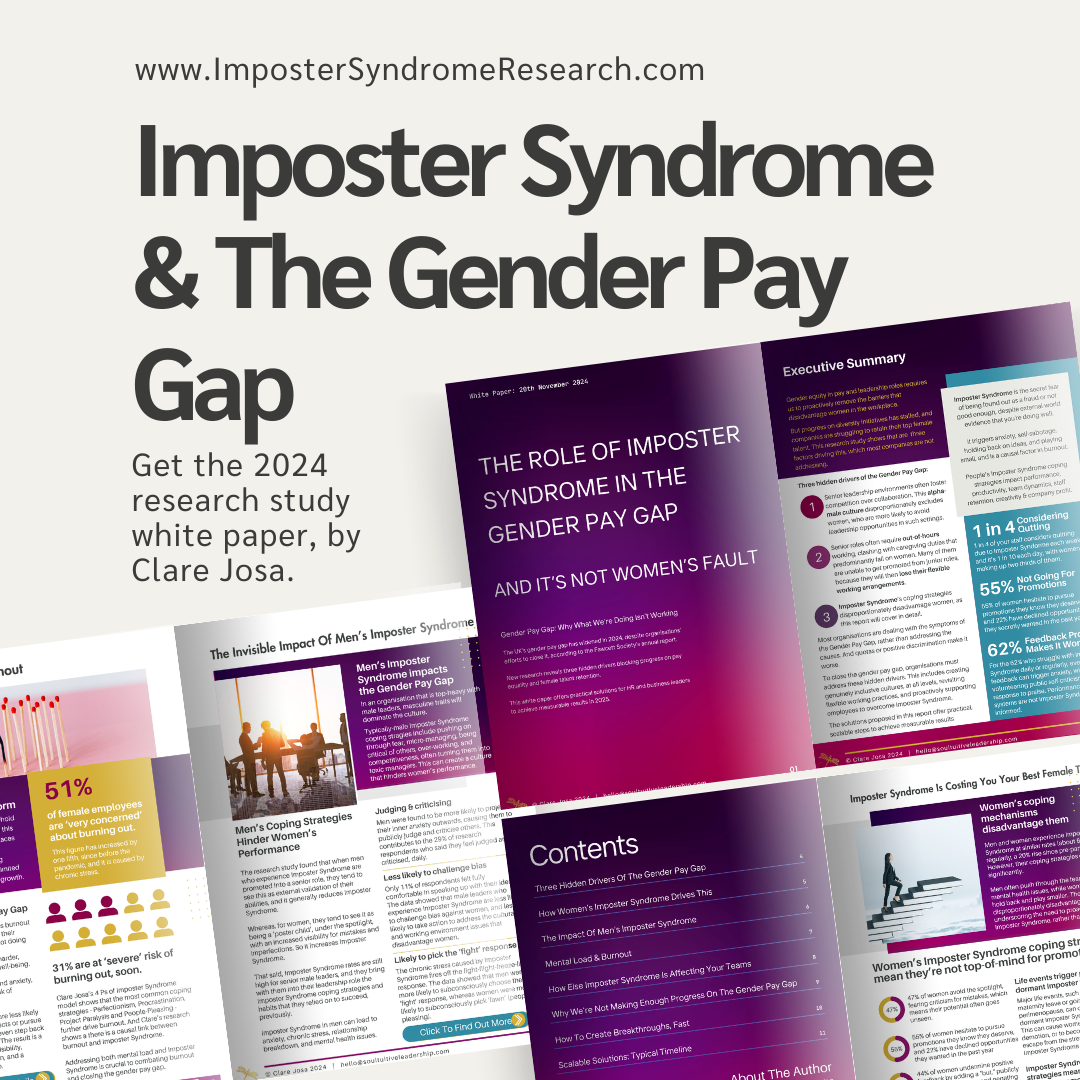What is really causing the gender pay gap?
We've just published the 2024 Imposter Syndrome research study. And part of it looks into the role of imposter syndrome in the gender pay gap and gender equality and diversity initiatives in general.
This episode is a must-listen episode for you if you care about having true equality and diversity at all levels of your organisation and if you're curious about the role that imposter syndrome is playing in that both for men and for women.
The gender pay gap has widened in 2024. We've been researching to find out why. And in this podcast episode I'm sharing 3 hidden causes of the gender pay gap, which very few companies are considering.
But without taking action on these, we won't close the gender pay gap.
Clare Josa, Lead researcher
2024 Imposter Syndrome research study
What You'll Learn About The 3 Hidden Causes Of The Gender Pay Gap
In this episode we're looking at three hidden causes of the gender pay gap, which very few organisations are addressing, which is why we're not making progress.
The shocking update from the Fawcett Society shows that the UK's Gender Pay Gap has actually widened in 2024, so what we're doing isn't working. It's time to find out why.
Listen Now: Episode 67
New Research: 3 Hidden Causes Of The Gender Pay Gap
Subscribe to the Ditching Imposter Syndrome Podcast
This Episode's Resources:
Research White Paper
Discover what the latest research says about the role of Imposter Syndrome in the Gender Pay Gap, and how organisations need to address this.
>>> Get The White Paper <<<
What's Your Score?
Clare has turned her research studies into a quiz-style assessment you can take to gain insights into how Imposter Syndrome is affecting your organisation.
>>> Take The Quiz <<<
Imposter Syndrome Practitioner™
On a mission to help others to ditch Imposter Syndrome? Get certified in Clare's breakthrough strategies.
>>> Find Out More <<<
Taking Action: #DoOneThing
Q: Who could you enlist to grow a group within your organisation, to ask the questions that no one is asking, so you can co-create a wave of change on these three hidden causes of the gender pay gap?
Join in the discussion in the Imposter Syndrome Hacks™ App - free - here's how

Prefer To Read? Here's The Transcript For This Episode.
Welcome to episode 67 of the Ditching Imposter Syndrome podcast with me, your host, Clare Josa.
And we're doing a mini series here because we're celebrating the publication of our latest research study which looks into the role of imposter syndrome in the gender pay gap and gender equality and diversity initiatives in general.
This is a must listen episode for you if you care about having true equality and diversity at all levels of your organization and if you're curious about the role that imposter syndrome is playing in that both for men and for women. So I'm doing a miniseries here. These episodes are going to be slightly shorter than usual because there's four of them coming out in one go.
To go into more detail on what you most need to know from what the research study is telling us about the role of imposter syndrome in the gender pay gap and equality, these four episodes are this one where we're going to look at three hidden drivers of the gender pay gap, which very few organizations are addressing, which is why we're not making progress. Then we'll look at the impact on women, specifically of imposter syndrome, on equality and diversity initiatives.
We're then going to have a surprising episode for many of you of the role of men's imposter syndrome in women's gender pay gap. This is a real must listen for you.
Then we're going to wrap up the series by looking at the hidden link between mental load, imposter syndrome and burnout in the gender pay gap. So for those of you who like to know that a research study is credible, this wasn't just a phone poll.
It's not something we dreamt up in the pub on the back of a beer mat. I used to be head of market research for one of the world's biggest and most disruptive brands. I've also got a research master's.
So I do know how to properly design a research study. This is a blend of both quantitative survey and qualitative depth interviews with a sample size of 5,000 UK employees.
But a huge amount of the data applies worldwide, albeit with cultural differences. So this has really got some substance to it. It's not just a poll that we did on LinkedIn.
And as I'm recording and publishing this episode in November 2024, it's almost exactly five years since my last major research study was published in 2019, coinciding with the publication of the Ditching Imposter Syndrome book.
The world has changed a lot since then, with multiple wars breaking out, with the COVID pandemic and unfortunately, the data that we're seeing in the research study shows that imposter syndrome levels, frequency and severity have all got worse across the general UK population. As I say, you can extrapolate this worldwide, subject to cultural differences.
In this episode, I want to talk to you about three hidden drivers of the gender pay gap that the research study has identified.
The role they're playing, how you can spot the hidden warning signs and what you can do both for yourself and for your organization to be able to start making progress on these. Lots of organizations are working hard on the gender pay gap, but the problem is in general they're doing the wrong thing.
They're looking at the symptoms rather than trying to identify the root causes and actually implement the deeper potentially cultural changes that need to happen to have genuine equality in leadership roles and in pay across the board. The Faucet Society is a well known campaign group on this topic and each year they declare when equal payday is.
That is the day after which each year women in organizations are effectively working unpaid compared to their male counterparts. When you think about this, that's actually really shocking.
This year, 2024, as I record this episode, that day has actually come forward by two days to the 20th of November. Last year it was the 22nd.
So that means there's an extra two days that women are effectively not being paid compared to their male counterparts this year in the UK compared to last year. In other words, the gender pay gap has widened. Progress has stalled. When I was at college, we always had a saying of don't get mad, get active.
And I have to admit I got really mad this year when I saw that the gender pay gap had widened. They estimate that to close it at the current rate, even if it hadn't widened this year is going to take like 100 years. This just isn't okay.
Equal pay legislation has been around for decades. So on the don't get mad, get active theme, we decided to include this as part of our research study into imposter syndrome.
This year we applied both the data that we got from that deep dive 5000 person UK based research study and also science and psychology to understand what is really going on and what we can do about it. In this episode, I'm going to talk to you about three hidden drivers, three hidden causes of the gender pay gap. They are.
Drumroll Number one, the alpha male culture at too many senior levels of organizations. Number two, the lack of flexible working and increased working hours expectations in more senior roles. And number three, imposter syndrome.
And it's not just women's imposter syndrome, it's also men's, as we will cover in another episode in this miniseries. So let's look at these in turn. Number one, the alpha male culture at the senior levels in far too many organizations.
There are so many companies that are gaining a fantastic reputation for being collaborative, inclusive, forward thinking, creative problem solving at every level until you hit leadership with a capital L.
And then it is an unspoken, acknowledged fact in those organizations that at those most senior levels, collaboration goes out of the window and suddenly everything is competitive. Alpha male driven and hustling.
In the episode on how men's imposter syndrome is affecting women's gender pay gap, we're going to go into more detail about exactly why this is happening. But for a moment, I invite you to think really, really openly and honestly about your organization.
Is there a level of seniority at which the culture changes, at which it does become competitive? People fighting their corner?
It's no longer acceptable to make mistakes where you are having to defend your turf, you're having to defend your particular part of the organization or your team. Is there a layer of leadership beyond which you actually have to turn quite kind of type A stress wise to be able to thrive and succeed?
What we see happening in organizations that secretly run this cultural model is either women hesitating and holding back from getting those senior level promotions because they simply don't want to work in those environments, or getting promoted into those roles and having to change how they show up to be able to fit in culturally. It is one of the biggest reasons why women who get promoted into those roles will quit their job or they will struggle to perform.
What's happening in this alpha male culture is if we look at the stress related fight, flight, freeze, fawn response, the culture is stuck in fight that becomes the go to. I've experienced it myself. It's one of the reasons why I quit the engineering career I loved.
Though I didn't realize imposter syndrome was behind it at the time. I'd got promoted into a senior enough role that I had responsibility for stopping the production line when there were quality issues.
I was a senior engineer and stopping that production line even back then cost $2,000 a minute.
It was a really high pressure manufacturing environment and having been promoted to a level where I had that level of responsibility meant the only way I could fit in was to turn as alpha male. As the men I was working with, the level of aggression, the level of stress, the level of fighting that was considered normal and acceptable.
Sparring, the kind of things that would be said and done in meetings that were actually really aggressive, offensive and inappropriate.
The only way I could survive in that job was to change how I was showing up, to change who I really was in order to fit into that alpha male aggressive culture. This actually really impacted me personally. I ended up on antidepressants for a short period. They made it worse. I came off them.
It destroyed my closest personal relationship.
I split up with my boyfriend I was living with, and it was harming every aspect of my health until I got to the stage where I felt I had to take a sabbatical in order to escape. I went traveling for a year in South America studying Spanish, and guess what? I didn't come back.
I changed jobs, I changed careers because I couldn't handle. I could handle, but I didn't want to become that version of me.
As said, we're going to discuss in the podcast episode on men's imposter syndrome and the impact on the gender pay gap why that behavior becomes normalized. But I am far from alone, and 20 years on, I still see this every week with clients.
So many organizations have all the stuff, you know, the wellbeing, the diversity, everything else at the lower levels. But when you hit the most senior levels, it becomes an environment that is hostile to the way most women think, live and work.
And this is one of the many reasons why quotas don't work. Positive discrimination doesn't work with positive discrimination.
Not only does that create a culture of the men who feel they missed out, then judging the women, saying, she only got this job because she's a girl, but it also forces women to go and live and work and breathe in an environment that risks causing them harm.
We need to address the culture, and that needs to start by having some very honest and open conversations about how the most senior levels of an organization are running. As children, we learn by modeling and mimicking, and that doesn't change as we grow up.
We might also learn from textbooks and podcasts and courses, but we still mirror what we see being modeled at the most senior levels of our organization.
So if the senior team is aggressive, hustling, full on hustle, bro, that alpha male, that highly driven, that fight response, then that will filter down into other layers of the organization and management style.
And because in so many organizations, this alpha male culture, secret alpha male culture at the most senior levels has been running for so many decades, it can be really hard for them to see this and they can end up Actually having what's called the backfire effect by Professor Brendan Nyhan is they dig their heels in and defend the fact that the company needs this alpha male culture. Actually, it doesn't. You can be driven and ambitious, but still do it in a way that is collaborative and doesn't harm the organization.
But it does take somebody brave to speak truth to power, to help the most senior leaders see that this is what's running and that it's one of the things that's really holding the organization back.
It is costing you some of your best female talent who are leaving to go and work for organizations who don't have this senior leadership culture factor number two is lack of flexible working and the increased working hours that are expected as you get promoted. Now, many organizations are doing some great work on truly flexible working. The world has changed.
Most people no longer have a housewife at home to manage their life so that they can focus just on work.
But what happens so often when people get promoted is they lose their flexible working that they'd previously negotiated and relied on to be able to do their job. Return to office mandates are having a huge impact on this.
Unfortunately, in the UK, the majority of caring responsibility for loved ones, for children, for family members, still falls on the shoulders of women. That is something we as a nation culturally need to address.
But with the costs of childcare being so high and there being a shortage of provision because so many companies offering childcare and afterschool clubs closed over the pandemic, understandably being told to go back into the office and add in an hour each way or more commute to your day can be impossible for many women. So this excludes them from the workforce.
You are losing some of your best women because you're not understanding that they actually have home commitments as well as work commitments, it doesn't mean they're not incredibly committed to their career. But they literally have to be somewhere near home at a certain point of the day to drop off and pick up their children.
And even in organizations that are pretty forward thinking on flexible working, our research study showed there's still a really key trend that at certain levels of promotion, those flexible working hours and practices are no longer considered appropriate. And if you continue to ask for them, you are perceived as not being dedicated enough to the role, the company or your promotion.
There's another side to this though.
Culturally, it's generally accepted in the UK that the more you get promoted, the more senior level your role, the longer hours you will work and the more out of hours work you Will do. This isn't just sitting at computer time that maybe you could do late in the evening once the family's asleep.
It's also things like out of hours travel and client entertaining.
And since the pandemic normalized video meetings, a huge number of people are also finding many more out of hours calls to accommodate parts of the organization or clients or customers or suppliers who are on vastly different time zones.
The problem is, if a woman has caring responsibilities, then being able to work late to do this additional workload, to be able to entertain clients, to be able to travel on a Sunday, for example, for a 9 o'clock Monday morning meeting somewhere can literally be impossible unless they have. In some organizations, senior women need two nannies, not one, to cover the hours that they're working. Now, that's simply not okay.
And it is a cultural thing in organizations that harks back to the 1950s, when senior men all had housewives who were able to take care of their lives outside work so that they could just focus on getting the job done. That is not how the world works anymore.
We need to rewrite the rules on how businesses ask employees, particularly at senior levels, to use their time. It's time to redesign how these roles work so that they no longer exclude people who've got caring responsibilities, which is predominantly women.
As I say, that's a cultural national issue we need to address. But right now, that is where we are.
If you have a role that requires significant out of hours work or travel, you are almost definitely going to be excluding some of your best female talent from applying and being successful in that role.
And in our research study, we found that 61% of people in senior roles said they had far too many meetings to be able to get their general workload done. So this is another huge thing, is the more you get promoted, the more meetings you have to attend.
Which seems kind of crazy when so many meetings could actually be emails. It's one of the downsides of remote working from the pandemic. It's far too easy now to arrange a massive meeting with lots of people.
Before, you'd have had to book a big room and get people's travel time in their diaries. Now it's simple.
I have clients and we met people in the research study who literally book annual leave to have a meeting free day to get their strategic work done. So current working practices are actually making it impossible for your leaders to succeed.
So many of them are having to do their main day's work outside of working hours. And that disproportionately disadvantages women.
So if you want to address this, you can look at what are the assumptions we're making about how senior roles need to work, the kind of things they're doing, the hours we're asking them to work, the amount of travel we're asking them to do, and how is that potentially excluding some of the best people in the organization from stepping into those roles and actually thriving then? The third hidden cause of the gender pay gap we found from the research study is imposter syndrome.
Imposter syndrome is not the natural healthy self doubt that comes when we're expanding and growing and stretching comfort zones. It is the secret fear of being found out as not good enough despite external world evidence that we are doing well.
We found those rates have gone up by a fifth since before the pandemic.
And you've now got 62% of your team members experiencing this daily or regularly to an extent that is affecting their performance, their productivity, people dynamics, their wellbeing, and ultimately company profits. And yet most organizations are ignoring this.
In two of the other episodes in this special series, we're going to look in more detail about how women's imposter syndrome is influencing the gender pay gap and it's not their fault, and the hidden role of men's imposter syndrome in the female gender pay gap. So I won't say much more about this at this stage.
If you're listening to this episode on my website, scroll down and you'll find a link to those three podcast episodes below.
If you're listening, wherever it is you love to get your podcasts, you want to look for episodes 68, 69 and 70 of the douching Imposter Syndrome podcast to find that information.
So those are three hidden causes of the gender pay gap, which I hope you'll agree very few organizations are addressing and yet we have to address this in order to have pay equality and equity in leadership roles in most organizations.
If you want to read the white paper in full, you can get a copy as my gift at Impostersyndromeresearch.com that's impostersyndromeresearch.com if you go to that link, you can register free and download the white paper. That wraps up what I wanted to share for this episode.
If you've got time, now is the ideal time to move on to episodes 68, 69 and 70 for some more really important and frankly quite shocking insights from the research study.



